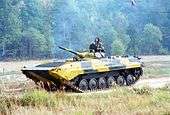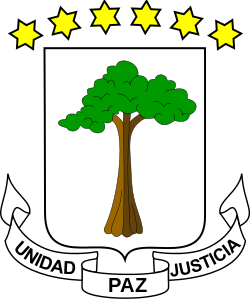Armed Forces of Equatorial Guinea
| Armed Forces of Equatorial Guinea | |
|---|---|
| Fuerzas Armadas de Guinea Ecuatorial | |
|
Coat of arms of Equatorial Guinea | |
| Service branches | Air Force of Equatorial Guinea |
| Leadership | |
| President of Equatorial Guinea | Teodoro Obiang Nguema Mbasogo |
| Minister of Defence | General Antonio Mba Nguema |
| Manpower | |
| Conscription | 18 years of age, 2 years selective compulsory service |
| Available for military service |
136,725 males, age 16–49, 138,018 females, age 16–49 |
| Fit for military service |
105,468 males, age 16–49, 107,919 females, age 16–49 |
| Reaching military age annually |
6,983 males, 6,726 females |
| Active personnel | 2,400 |
| Expenditures | |
| Percent of GDP | 0.1% (2006 est.) |
| Industry | |
| Foreign suppliers |
|
The Armed Forces of Equatorial Guinea (in Spanish: Fuerzas Armadas de Guinea Ecuatorial) consists of approximately 2,500 service members. The army has almost 1,400 soldiers, the police 400 paramilitary men, the navy 200 service members, and the air force about 120 members. There is also a Gendarmerie, but the number of members is unknown. The Gendarmerie is a new branch of the service in which training and education is being supported by the French Military Cooperation in Equatorial Guinea.[1] Military appointments are all reviewed by President Teodoro Obiang, and few of the native militiamen come from outside of Obiang's Mongomo-based Esangui clan. Obiang was a general when he overthrew his uncle, Francisco Macías Nguema.
Overall the military is poorly trained and equipped. It has mostly small arms, RPGs, and mortars. Almost none of its Soviet-style light-armored vehicles or trucks are operational.
The Armed Forces were reorganized in 1979. In 1988, the United States donated a 68-foot patrol boat to the Equatoguinean navy to patrol its exclusive economic zone. The U.S. patrol boat Isla de Bioko is no longer operational.[2] U.S. military-to-military engagement has been dormant since 1997 (the year of the last Joint Combined Exchange Training exercise). Between 1984 and 1992, service members went regularly to the United States on the International Military Education Training program, after which funding for this program for Equatorial Guinea ceased. The government spent 6.5% of its annual budget on defense in 2000 and 4.5% of its budget on defense in 2001. It recently acquired some Chinese artillery pieces, some Ukrainian patrol boats, and some Ukrainian helicopter gunships. The number of paved airports in Equatorial Guinea can be counted on one hand, and as such the number of airplanes operated by the air force is small. The Equatoguineans rely on foreigners to operate and maintain this equipment as they are not sufficiently trained to do so. Cooper and Weinert 2010 says that all aircraft are based on the military side of Malabo International Airport.[3]
In 2002, a report said "The oil companies do not view Equatorial Guinea's military – a product of decades of brutal dictatorial rule – with much confidence. The army is believed to have only about 1,320 men under arms, the navy 120, and the air force 100. Seven of the army's nine generals are relatives of the president; the other two are from his tribe. There is no clear command structure, the level of discipline is low, and professionalism and training are almost non-existent, according to locals and foreign oil workers. Even the presidential guard – an indication of the lack of trust in the country's forces – is composed of 350 Moroccan troops."[4] One general may be General Agustin Ndong Ona, reported in 2004.
In July 2010, after the visit of Brazilian president, Luiz Inácio Lula da Silva, the sale of a Barroso-class corvette to be constructed in Brazil was announced.[5]
On 6th November 2016 the Zimbabwe Defence Forces deployed a training contingent to the Equatorial Guinea to train the country’s military officers on operational and logistic matters following an urgent request by the West African country. The security personnel contingent, is composed of members of the Zimbabwe National Army and Air Force of Zimbabwe.
Equipment
| Name | Origin | Type | In service | Photo | Notes | |
|---|---|---|---|---|---|---|
| Armored fighting vehicle | ||||||
| BTR-152 | |
APC | 10[1] |  |
||
| BMP-1 | |
Infantry fighting vehicle | 20 [1] |  |
||
Small arms
| Name | Origin | In service | Photo | Notes |
|---|---|---|---|---|
| AKM | | |||
| FN FAL | ||||
| RPD | |  | ||
| RPG-7 | |
Future Equipment
Possible purchase of 20 BMP-3 from Russia.
Aircraft
Current inventory

| Aircraft | Origin | Type | Variant | In service | Notes | |
|---|---|---|---|---|---|---|
| Combat Aircraft | ||||||
| Su-25 | Russia | attack | 4[6] | |||
| Transport | ||||||
| An-72 | Ukraine | heavy transport | 1[6] | |||
| CASA C-295 | Spain | Transport + Maritime Surveillance | 2[7] | |||
| Helicopters | ||||||
| Ka-27 | Russia | utility | Ka-29 | 1[6] | ||
| Mil Mi-26 | Russia | utility / transport | 1[6] | |||
| Mil Mi-24 | Russia | attack | Mi-35 | 7[6] | ||
| Trainer Aircraft | ||||||
| L-39 | Czech Republic | jet trainer | 2[6] | |||
On 26 January 2016 the Air Force of Equatorial Guinea signed a contract for the delivery of two CASA C-295 transport aircraft, the first as a troop transport and the second for maritime surveillance to be delivery in 2017.[7]
Navy
As piracy and robbery at sea is a significant threat in the Gulf of Guinea, the country is investing heavily in the Navy to protect its oil installations from these and other security challenges. In 2010 a Brazilian Corvette was purchased, the corvette was then renamed Bata when it entered service in the navy of Equatorial-Guinea.
- Flagship: Frigate 'Wele Nzas' [8] (F 073). 2,500 tonnes, 107 m
- Corvette Barroso-class ‘Bata’ (OPV-88). 1,360 tonnes, 88 m
- 2 Shaldag class fast patrol boat[9]
- 1 Daphne class patrol boat - 170 tons full load - commissioned 1963
- 2 Zhuk class patrol boats
- 2 Kalkan class patrol craft - 8.5 tons full load
- 1 Esturaio de Muni class OPV
- 1 P-183\P-6 class FAC -status unknown.
Notes
- 1 2 3 "Equatorial Guinea". Flightglobal Insight. Retrieved 20 June 2015.
- ↑ U.S. Department of State, Equatorial Guinea Background Note 01/02
- ↑ Cooper and Weinert 2010, p142
- ↑ Sunday Dare, The Curious Bonds of Oil Diplomacy, Center for Public Integrity, November 6, 2002
- ↑ Felipe Salles. "Lula anuncia venda de navio da classe Barroso para Guiné Equatorial". Retrieved 23 October 2014.
- 1 2 3 4 5 6 "World Air Forces 2015 pg. 15". Flightglobal Insight. 2015. Retrieved 19 June 2015.
- 1 2 "Military News and Updates". Scramble. Dutch Aviation Society. March 2016. p. 65. ISSN 0927-3417.
- ↑ http://www.defenceweb.co.za/index.php?option=com_content&view=article&id=35203:equatorial-guinea-commissions-new-frigate&catid=51:Sea&Itemid=106
- ↑ "Defense & Security Intelligence & Analysis: IHS Jane's - IHS". Retrieved 23 October 2014.
References
| Wikimedia Commons has media related to Military of Equatorial Guinea. |
- Central Intelligence Agency (CIA). "CIA - The World Factbook - Equatorial Guinea". The World Factbook. CIA. Retrieved 12 January 2010.
- International Institute for Strategic Studies (2009). The Military Balance. Routledge. ISBN 1857435168.
Further reading
- Cooper, Tom & Weinert, Peter (2010). African MiGs: Volume I: Angola to Ivory Coast. Harpia Publishing LLC. ISBN 978-0-9825539-5-4.
- Jeremy Binnie, 'Boom Time - Equatorial Guinea,' Jane's Defence Weekly, 30 May 2012.
